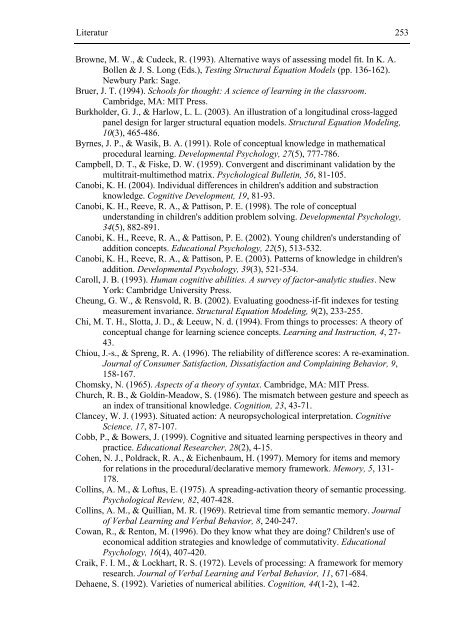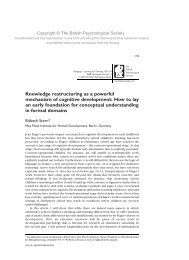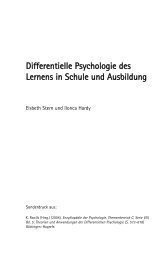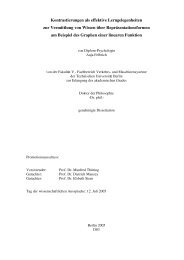Konzeptuelles und prozedurales Wissen als latente Variablen: Ihre ...
Konzeptuelles und prozedurales Wissen als latente Variablen: Ihre ...
Konzeptuelles und prozedurales Wissen als latente Variablen: Ihre ...
Erfolgreiche ePaper selbst erstellen
Machen Sie aus Ihren PDF Publikationen ein blätterbares Flipbook mit unserer einzigartigen Google optimierten e-Paper Software.
Literatur 253<br />
Browne, M. W., & Cudeck, R. (1993). Alternative ways of assessing model fit. In K. A.<br />
Bollen & J. S. Long (Eds.), Testing Structural Equation Models (pp. 136-162).<br />
Newbury Park: Sage.<br />
Bruer, J. T. (1994). Schools for thought: A science of learning in the classroom.<br />
Cambridge, MA: MIT Press.<br />
Burkholder, G. J., & Harlow, L. L. (2003). An illustration of a longitudinal cross-lagged<br />
panel design for larger structural equation models. Structural Equation Modeling,<br />
10(3), 465-486.<br />
Byrnes, J. P., & Wasik, B. A. (1991). Role of conceptual knowledge in mathematical<br />
procedural learning. Developmental Psychology, 27(5), 777-786.<br />
Campbell, D. T., & Fiske, D. W. (1959). Convergent and discriminant validation by the<br />
multitrait-multimethod matrix. Psychological Bulletin, 56, 81-105.<br />
Canobi, K. H. (2004). Individual differences in children's addition and substraction<br />
knowledge. Cognitive Development, 19, 81-93.<br />
Canobi, K. H., Reeve, R. A., & Pattison, P. E. (1998). The role of conceptual<br />
<strong>und</strong>erstanding in children's addition problem solving. Developmental Psychology,<br />
34(5), 882-891.<br />
Canobi, K. H., Reeve, R. A., & Pattison, P. E. (2002). Young children's <strong>und</strong>erstanding of<br />
addition concepts. Educational Psychology, 22(5), 513-532.<br />
Canobi, K. H., Reeve, R. A., & Pattison, P. E. (2003). Patterns of knowledge in children's<br />
addition. Developmental Psychology, 39(3), 521-534.<br />
Caroll, J. B. (1993). Human cognitive abilities. A survey of factor-analytic studies. New<br />
York: Cambridge University Press.<br />
Cheung, G. W., & Rensvold, R. B. (2002). Evaluating goodness-if-fit indexes for testing<br />
measurement invariance. Structural Equation Modeling, 9(2), 233-255.<br />
Chi, M. T. H., Slotta, J. D., & Leeuw, N. d. (1994). From things to processes: A theory of<br />
conceptual change for learning science concepts. Learning and Instruction, 4, 27-<br />
43.<br />
Chiou, J.-s., & Spreng, R. A. (1996). The reliability of difference scores: A re-examination.<br />
Journal of Consumer Satisfaction, Dissatisfaction and Complaining Behavior, 9,<br />
158-167.<br />
Chomsky, N. (1965). Aspects of a theory of syntax. Cambridge, MA: MIT Press.<br />
Church, R. B., & Goldin-Meadow, S. (1986). The mismatch between gesture and speech as<br />
an index of transitional knowledge. Cognition, 23, 43-71.<br />
Clancey, W. J. (1993). Situated action: A neuropsychological interpretation. Cognitive<br />
Science, 17, 87-107.<br />
Cobb, P., & Bowers, J. (1999). Cognitive and situated learning perspectives in theory and<br />
practice. Educational Researcher, 28(2), 4-15.<br />
Cohen, N. J., Poldrack, R. A., & Eichenbaum, H. (1997). Memory for items and memory<br />
for relations in the procedural/declarative memory framework. Memory, 5, 131-<br />
178.<br />
Collins, A. M., & Loftus, E. (1975). A spreading-activation theory of semantic processing.<br />
Psychological Review, 82, 407-428.<br />
Collins, A. M., & Quillian, M. R. (1969). Retrieval time from semantic memory. Journal<br />
of Verbal Learning and Verbal Behavior, 8, 240-247.<br />
Cowan, R., & Renton, M. (1996). Do they know what they are doing? Children's use of<br />
economical addition strategies and knowledge of commutativity. Educational<br />
Psychology, 16(4), 407-420.<br />
Craik, F. I. M., & Lockhart, R. S. (1972). Levels of processing: A framework for memory<br />
research. Journal of Verbal Learning and Verbal Behavior, 11, 671-684.<br />
Dehaene, S. (1992). Varieties of numerical abilities. Cognition, 44(1-2), 1-42.





